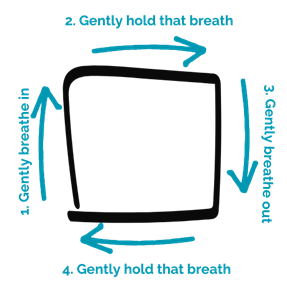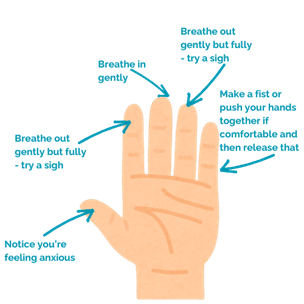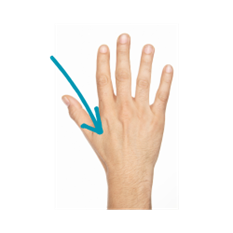Mental Altitude
Quick Relaxation Techniques Tip Sheet
I promised to write a tip sheet for quick relaxation techniques in a recent blog about clinical health psychology, where I was talking about handling difficult conversations with your healthcare team. That’s just one example of situations where skills like these might come in useful. For patients, they might also be useful when facing surgery or difficult treatment. For pilots they can help in anxiety provoking situations we encounter regularly in our annual training / testing cycle.
“Here’s the science bit”!
I don’t always use relaxation techniques to directly target anxiety but for the purposes of this tip sheet, that is what I’m aiming to help you do. You may have read about cognitive behavioural therapy and how it describes how our emotions, thoughts, physical sensations and behaviours all interact. That means that although we can only rarely, if ever, directly influence our emotions, we can work on the physical sensations, thoughts and behaviours that are connected to unhelpful emotions such as anxiety. Did you know for example that one cause of fear of flying is that fact that many passengers experience low-level physical symptoms of experiencing lower levels of oxygen than normal? While this is completely safe, the physical symptoms can be very similar to those of anxiety; our brain can interpret this as meaning that there must be something to be anxious about and a vicious cycle can start producing significant levels of anxiety. It's called ex-consequentia reasoning. In essence, my body feels anxious therefore I must be in danger.
An important note: don’t forget that anxiety isn’t always unhelpful. Our brains are sophisticated threat detectors that evolved over thousands of years and can sometimes misjudge the threat level in the twenty-first century producing unhelpful anxiety. If your brain is making you feel anxious about getting too close to a cliff or doing something dangerous though, don’t use anxiety reducing skills, get out of the way!
What does that mean? Firstly, it means that telling yourself to “pull yourself together” or “stop worrying” isn’t going to help! What you can do is have some skills ready to help with physical sensations, thoughts and behaviours can significantly reduce anxiety. Take a few moments to think about what you experience when you feel anxious. Most people identify significant physical symptoms so that might be the best type of skill to start with. I’m going to concentrate on techniques that target that here. I will write more about targeting thoughts and behaviour in other tip sheets for Mental Altitude.
The techniques
You may already know some relaxation skills including these. If they work for you in the situation you’re preparing for as you read this, you might just need to practice them. As a rule of thumb, if you can use the technique effectively while doing something else, it’s most likely to be effective under stress. I practice while swimming, you might want to try while doing any form of exercise that doesn’t need your whole attention, walking the dog or any safe, not too demanding activity.
Breathing Techniques
Controlling our breathing is one of the fastest to learn and effective relaxation skills. Here are some you might want to try:
· Just breathe: did you know that breathing calmly and to a regular pattern for a minute can reduce your heart rate and blood pressure by 10%? That can have a significant impact on the physical sensation of anxiety. To start with, find a comfortable rhythm for you, counting as you breathe in and out can be helpful. Try and breathe so that you breathe in for the same “count” that you breathe out. Most people find that a count of three to six is comfortable. If you know what works for you before you face an anxiety-provoking situation, this skills is most likely to be useable for you.
· Box breathing: follow the picture below to breathe in four steps. Again it works best if you count the same for each stage.


· Calming hand: I like this one because you can use the thumb and fingers on your hand to remind you of the five steps:


Muscle relaxation
A very common physical symptom of anxiety is muscle tension: clenching your jaw, tense and raised shoulders, tight grip (“white knuckles”) and so on. Here are a few quick skills that should help:
· Tense and release specific muscles: Clench and relax your fists or jaw. If you’re sitting somewhere quite public, clenching and relaxing your buttocks can be surprisingly effective as they’re large muscles people are unlikely to see you move!
· Scan and relax: Work from your toes up, paying attention to each part pf your body in turn and relax any areas of tension.
· Accupressure: there’s a well research pressure point on the webbing between your thumb and index finger where gentle pressure can help reduce anxiety:


I hope you find some of these techniques useful. Do follow my social media for more and to let me know how you get on.
Coming soon!
Get ready for the launch of something really exciting. Imagine being able to select psychological self help skills specifically tailored to aviation professionals aimed at building your skills and knowledge in managing your psychological wellbeing in this wonderful but challenging industry. Scientific research demonstrates that evidence based self help is effective in preventing some mental health issues and promoting good mental health. For a small monthly subscription, you'll be able to access detailed self help on topics such as those covered on my blog pages. The blogs all have one tip related to each subject but I'm never going to claim "one size fits all' The materials you can access through "Mental Altitude" have many more so that you can select the ones that suit you.
Subscribing to Mental Altitude will mean you can select the worksheets, podcasts or detailed exercises most interesting to you and download them to a smartphone, tablet or laptop to keep. With Mental Altitude, pilots can access a range of tools and techniques to help improve their mental wellbeing and performance in the cockpit. From stress management strategies to confidence-building exercises, our program is created to address the unique psychological challenges that pilots face in their line of work. Subscribers will have access to exclusive content developed by experienced aviation psychologists. Mental Altitude aims to support pilots in maintaining a healthy mindset and coping with the pressures of their demanding profession. Join Mental Altitude today and take the first step towards a healthier and more resilient mind in the skies.
Struggling to manage sleep around an aviation style shift pattern and/or jet lag? Start with the worksheet on sleep hygiene and applying that in hotel accommodation, add in a recorded relaxation routine designed for hotel stays and have a look at the sleeping at home tip sheet.
Finding it a challenge to manage family commitments with young children? Start with the detailed tip sheet on managing relationships at 30 000 ft (a much more detailed version one than the blog with many tips). Use the "how do we talk about this" worksheet to support difficult conversations at home or "Keeping in touch" to help you and your family communicate across time zones and continents.
Think you're fine but want too make sure you stay that way: Mental Altitude has a library of App Guides pointing you at (among other things) sleep aids, relaxation apps and games that support focus and relaxation and suggestions on how to use them to get the most impact on your psychological wellbeing.
All of this and more coming soon. Sign up to the launch list to be among the first to find out about Mental Altitude soon!
